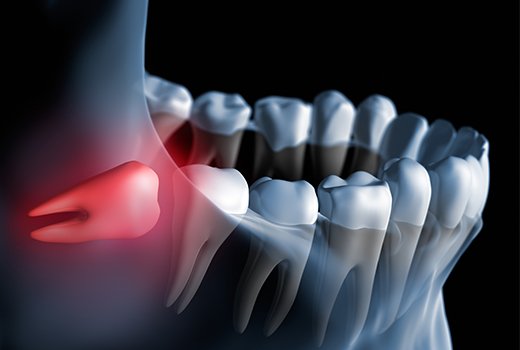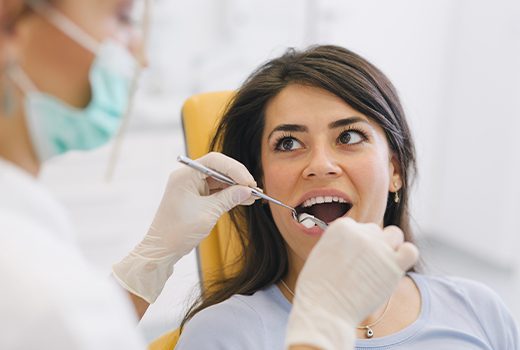Tooth Extractions – Lynchburg ,VA
Doing What’s Necessary for Your Smile’s Health
At Peery & Woolwine Family Dentistry, we do our best to handle every problem with conservative treatment. If at all possible, we save a natural tooth through root canal therapy or other procedures, but sometimes, extraction is the only viable choice in order to keep the rest of your smile healthy. If we recommend removing a tooth, you can be sure that we will explain our reasons clearly so that you feel comfortable moving forward.
Why Choose Peery & Woolwine Family Dentistry
for Tooth Extractions?
- Nitrous Oxide Sedation Offered
- Friendly, Caring Dental Professionals
- Dental Emergencies Welcome
Why Would a Tooth Need to Be Extracted?

There are several scenarios in which extraction may be the best treatment option, including the following:
- A severely broken or injured tooth cannot be salvaged.
- Advanced tooth decay has left insufficient healthy structure to support a dental crown and will likely spread to other teeth if the tooth is left in place.
- Overcrowded teeth are interfering with orthodontic treatment.
- Improperly erupted teeth are likely to develop an infection.
As previously mentioned, our dentists will consider all conservative treatment options before resorting to extraction. If needed, we offer several replacement options, including dental implants, to restore your smile to full health and appearance after tooth loss.
What Is the Aftercare for Extractions?

At Peery & Woolwine Family Dentistry, we walk our patients through every step of the process, ensuring that they are completely comfortable. If you undergo an extraction with us, we will provide you with specific instructions for taking care of the site after the procedure, but below are just some of the things you need to do to heal properly:
- Keep gauze on the site for a few hours following the procedure.
- Use a cold compress to manage the swelling.
- Allow a clot to form over the treatment site and do not remove it.
- Avoid using a straw or making sucking motions because this could dislodge the clot and lead to an infection called dry socket.
- Eat soft foods for a few days, slowly building back up to your normal diet.
- Rinse your mouth with saltwater to keep the site clean and avoid it when you brush your remaining teeth.
- Contact our Lynchburg office if you experience a fever or severe pain that lasts more than a few days.
How Much Do Tooth Extractions Cost?

Wondering how much your tooth extraction in Lynchburg will cost you? There isn’t a set price for tooth extractions because of how many variables there are to consider. When you see us for your consultation, we’ll evaluate your unique situation and look at factors like where the tooth is in your mouth and your insurance coverage. From there, we can give you a personalized estimate and review all your payment options. Taking care of your oral health by removing that problematic tooth may be much more affordable than you think! Keep reading to learn more about the cost of tooth extractions.
Factors That Can Affect Tooth Extraction Cost

The cost of removing a tooth can vary widely from one patient to another, so we won’t be able to give you an estimate until we’ve evaluated you. Once we’ve examine your tooth, we’ll have a better understanding of all the factors that will influence the price of your tooth extraction, including the following:
- The size and shape of the tooth in need of removal
- The location of the problematic tooth in your mouth
- The number of teeth that need to be extracted
Additionally, it’s also important to consider the cost of replacing the tooth after its extraction. Even if you’re having a back tooth removed that you can’t see, restoring your complete smile is important for many reasons. Untreated tooth loss allows teeth to shift out of place, which can cause bite problems and increase your risk of oral health issues. We’re proud to offer a variety of tooth replacement options here at our office, and we’ll be happy to review your options and their potential costs.
Does Dental Insurance Cover Tooth Extractions?

Dental insurance coverage is generally split up into the different categories of services. A tooth extraction is often labeled as a “major restoration or procedure” which will usually earn it around 50% coverage. However, it’s important to know that your plan may have specific stipulations about how many teeth in a certain timeframe your insurance will cover extracting. Plus, your benefits will only kick in once you’ve met your deductive and before you’ve reached your annual maximum.
Every dental insurance policy is slightly different, so make sure to review the details of your plan or contact your insurance provider to get a better idea of your coverage. Additionally, our knowledgeable front desk staff would be happy to help maximize your benefits. We are in-network with several major PPO insurances, including Anthem, Metlife, Cigna, and many more.
Other Options for Making Tooth Extractions Affordable

Dental insurance isn’t your only option for an affordable tooth extraction. Uninsured patients may be interested in applying for CareCredit financing. This service allows you to break up the cost of your treatment into monthly installments over a longer period of time. Most of these payment plans even come with little to no interest!
Tooth Extractions FAQs
What Can I Do to Speed Up the Healing Time?
Unfortunately, there isn’t a magic pill you can take that will speed up the healing time. There is, however, one thing you can do to prevent complications: focus solely on recovering. Oftentimes, patients get back into the swing of things too quickly – whether that’s eating crunchy foods or working out – which only prolongs the healing process. So, do your best to follow all of the aftercare instructions we give you, starting with dedicating a few days to resting.
Does Getting a Tooth Extracted Hurt?
Even if you don’t struggle with dental-related anxiety, you might be a bit worried that having a tooth extracted will hurt. Don’t worry – we will thoroughly numb your mouth beforehand to ensure you don’t feel pain. We will also provide you with aftercare instructions to keep soreness, sensitivity, and discomfort at bay, like taking OTC pain medication as directed and avoiding crunchy, hot, acidic, and spicy foods.
What Are My Options for Replacing a Missing Tooth?
There are three tooth-replacement options: dental bridges, dentures, and dental implants. Each one has its own set of benefits, as well as different costs and procedures. Ultimately, the decision of which one is best for you will be something that you and your Lynchburg dentist decide together. During this process, they will consider the extent of the tooth loss, your lifestyle, your oral hygiene habits, and your budget. That way, you can enjoy the results both now and years from now.
Can I Leave the Space Empty After a Tooth Extraction?
If your tooth was removed because it was badly decayed or damaged, then you shouldn’t leave the space empty. After all, even teeth that don’t show when you smile serve an important purpose. With all of that said, there are some cases where a dental bridge, denture, or dental implant isn’t needed, like if the tooth was extracted to address overcrowding prior to orthodontic treatment.
Can I Smoke After Getting a Tooth Extracted?
Using tobacco products before or after your tooth extraction can lead to several complications, including delayed healing. For that reason, we ask our patients to abstain from using cigars, cigarettes, e-cigarettes, and the like both leading up to their appointment and for two weeks afterward. In fact, this is a great opportunity to quit altogether!
How Should I Prepare for a Tooth Extraction?
It’s important to prepare ahead of time so that your recovery is as smooth as possible. A few things we recommend are having someone drive you home from your appointment and stay with you for the first night, if possible. We also encourage our patients to go to the store beforehand. That way, they have everything they need already – from over-the-counter pain medication to soft foods and cold compresses.
How long after a tooth extraction can I get dentures?
While each case is different, the average timeframe to wait until you can receive dentures is 6-8 weeks. You will need to fully heal from your extraction procedure before dental impressions can be taken of your mouth. We’ll also need to measure your jaw to ensure your new dentures are crafted to fit correctly and comfortably.
It is possible that while your dentures are being fabricated, you can wear temporary ones to allow your tongue, cheeks, gums, and lips to get used to them.
What should I do after my tooth extraction?
After you have your tooth extractions in Lynchburg, you’ll need to follow the guidelines provided by our team, as this will allow you to heal successfully and without complications. It’s best if you avoid physical activity and tobacco use for at least 24 hours, and you’ll need to make sure that you drink a lot of water. This will help keep your mouth moist and flushed of harmful bacteria that might otherwise try to negatively affect your oral health.
It's essential that the blood clot(s) form during this time to keep from developing a dry socket, so do not sip through a straw, rinse vigorously, or spit. Also, continue to eat soft foods so that you do not irritate the extraction sites or cause your blood clot(s) to dislodge.
If you begin to feel discomfort, you can take an over-the-counter pain reliever or use a cold compress.
Is there an alternative to a tooth extraction?
Generally, if your dentist is suggesting tooth extraction, it’s because there is no other alternative that is sufficient in saving your smile. If other options are available, such as a dental crown or root canal treatment, these will likely be pursued before tooth extraction is mentioned as a last resort.
You can always do things to avoid tooth extraction, such as practice good oral hygiene at home, regularly see your dentist for six-month checkups and cleanings, avoid bad habits, eat healthy foods, and better protect your mouth while playing sports.
